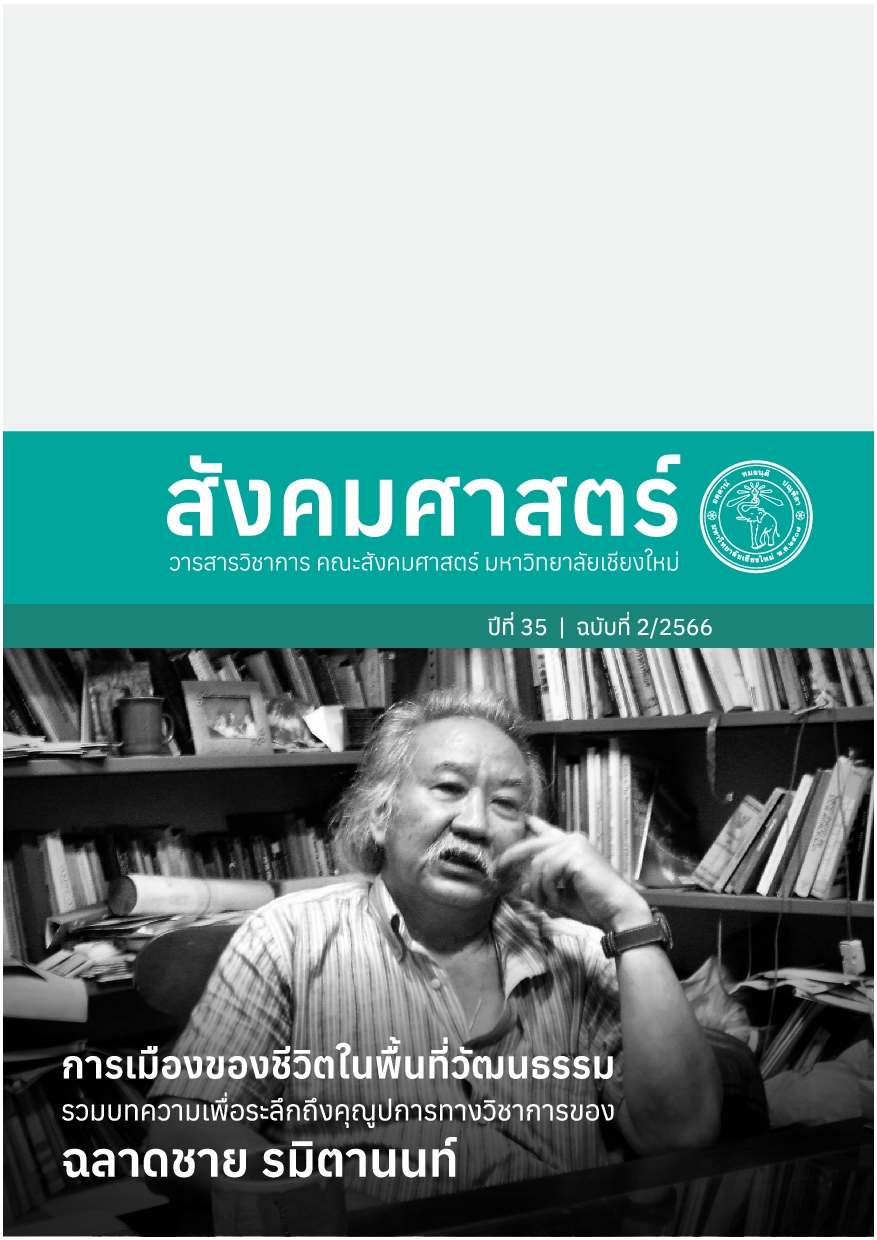From Social Forestry to Community Rights in Thai Society
Main Article Content
Abstract
Under the influences of mainstream forest conservation, various groups who are cultivating in the forest are frequently blamed as the forest destroyer through shifting cultivation discourses which misunderstand the actual practices of forest utilization. Based on academic view of forest as an ecosystem with outside socio-political relationships, several participatory research between academics, local people, and NGO workers are carried out in situ. Local people are found not simply use the forest but also have knowledge and regulations for forest management as well as protect forest from outside encroachment, especially in a form of community forestry. Existing largely in forms of customary, ritual practices and beliefs, they are not easily visible to most people who are trapped in the myths of fixed discourse. Research findings partly help disrupting those myths by providing some understanding in community rights. This concept inspires social movements in the struggles to transform local custom into community forest law, partly through negotiating space of forest conservation rituals. Although the passing of community forest law has not yet achieved, the social movement has opened new and alternative avenue for participatory management of conservation forest.
Article Details

This work is licensed under a Creative Commons Attribution-NonCommercial-NoDerivatives 4.0 International License.
All written articles published on Journal of Social Sciences is its author’s opinion which is not belonged to Faculty of Social Sciences, Chiang Mai University or is not in a responsibility of the journal’s editorial committee’s members.
References
เจิมศักดิ์ ปิ่นทอง, บก. 2534. วิวัฒนาการของการบุกเบิกที่ดินทำกินในเขตป่า. กรุงเทพฯ: สถาบันชุมชนท้องถิ่นพัฒนา.
ฉลาดชาย รมิตานนท์. 2528. ป่าไม้สังคมกับการพัฒนาชนบท. พิมพ์ครั้งที่ 1. กรุงเทพฯ: สมาคมสังคมศาสตร์แห่งประเทศไทย.
เบญจพรรณ เอกะสิงห์, ฉลาดชาย รมิตานนท์, และเบญจวรรณ ทองศิริ. 2540. วิวัฒนาการบุกเบิกที่ดินทำกินในเขตป่า: กรณีศึกษาภาคเหนือตอนล่าง. เชียงใหม่: ศูนย์วิจัยเพื่อเพิ่มผลผลิตทางการเกษตร คณะเกษตรศาสตร์ มหาวิทยาลัยเชียงใหม่.
เสน่ห์ จามริก, และยศ สันตสมบัติ, บก. 2536. ป่าชุมชนในประเทศไทย: แนวทางการพัฒนา. เล่ม 1-3. กรุงเทพฯ: สถาบันชุมชนท้องถิ่นพัฒนา.
อานันท์ กาญจนพันธุ์, และมิ่งสรรพ์ ขาวสอาด. 2538. วิวัฒนาการบุกเบิกที่ดินทำกินในเขตป่า: กรณีศึกษาภาคเหนือตอนบน. กรุงเทพฯ: สถาบันวิจัยเพื่อการพัฒนาประเทศไทย.
Blaikie, Piers. 1985. The Political Economy of Soil Erosion in Developing Countries. London: Routledge.
Blaikie, Piers, and Harold Brookfield, eds. 1987. Land Degradation and Society. New York: Routledge.
Latour, Bruno. 2005. Reassembling the Social: An Introduction to Actor-Network-Theory. Oxford New York: Oxford University Press.
Marx, Karl. 1909. Capital: A Critique of Political Economy, Volume I: The Process of Capitalist Production. Translated from the 3rd German edition, by Samuel Moore and Edward Aveling, edited by Frederick Engels. Chicago: Charles H. Kerr and Co.
Rambo, A. Terry, and Percy E. Sajise, eds. 1984. An Introduction to Human Ecology Research on Agricultural Systems in Southeast Asia. Laguna, Philippines: East-West Environment and Policy Institute and University of the Philippines at Los Banos.
Smith, Neil. 1984. Uneven Development: Nature, Capital, and the Production of Space. Athens, Georgia: The University of Georgia Press.
Uraivan Tan Kim Yong. et al. 1988. Natural Resource Utilization and Management in Mae Khan Basin: Intermediate Zone Crisis. Chiang Mai: Resource Management and Development Project, Faculty of Social Sciences, Chiang Mai University.


